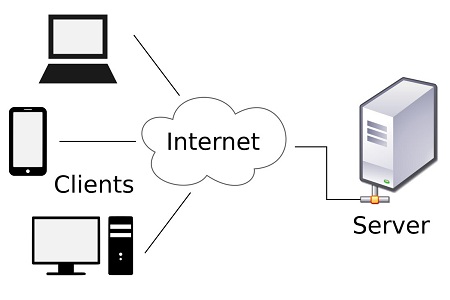Home >Operation and Maintenance >Windows Operation and Maintenance >what is server
what is server
- 青灯夜游Original
- 2018-12-03 10:33:28100141browse
In a technical sense, a server is an instance of a computer program or device that handles requests and transfers data to another computer over the Internet or a local network; a server is used to manage network resources; for example, users The server can be set up to control access to the network, send/receive email, manage print jobs, or host a website.

#The operating environment of this article: Windows 7 system, Dell G3 computer.
What is a server? This article will introduce to you what a server is? What are the common server types? Let everyone have a simple understanding of the server, I hope it will be helpful to you.
What is a server?
In a technical sense, a server is an instance of a computer program or device (essentially a computer) that handles requests and transfers data to another server over the Internet or a local network. A computer.
What is the server used for?
The server is used to manage network resources. For example, users can set up the server to control access to the network, send/receive emails, manage print jobs, or host a website. They are also good at performing intense calculations. Some servers are also dedicated to specific tasks, often called dedicated tasks. However, many servers today are shared servers, which in the case of web servers can take on the responsibility of email, DNS, FTP, and even multiple websites.

Special Features and Functions of Server
Almost any personal computer can act as a network server. However, typically a software or hardware system specialized computer has features and configurations just for this task. For example, a dedicated server may have high-performance RAM, a faster processor, and multiple high-capacity hard drives. Additionally, dedicated servers can be connected to redundant power supplies, multiple networks, and other servers. This connection characteristics and configuration are necessary because many client machines and client programs may depend on them to function efficiently, correctly, and reliably.
In order to operate in a unique network environment where many computers and hardware or software systems rely only on one or more server computers, servers often have special features and capabilities, including:
1. The ability to update hardware and software without restarting or restarting.
2. Advanced backup function, which can frequently back up critical data.
3. Advanced network performance.
4. Automatic (invisible to the user) data transmission between devices.
5. Highly secure resource, data and memory protection.
Common Server Types
Your computer may require many services to work. Therefore, there are different types of servers available. Let’s introduce what are the common server types?
Web Server:
Web server displays pages and runs applications through a web browser. The server our browser is now connected to is a web server that serves this page and any images you see on it. In this case, the client program is most likely a browser such as Internet Explorer, Chrome, Firefox, Opera, or Safari. In addition to serving simple text and images, web servers can be used for a variety of things, such as uploading and backing up files online through cloud storage services or online backup services.
Email Server:
Email server facilitates sending and receiving emails. If we have an email client on our computer, the software will connect to an IMAP or POP email server to download the mail to your computer, and the SMTP server will send the mail back through the email server.
FTP Server:

FTP server supports moving files through File Transfer Protocol tools. The FTP server can be accessed remotely through an FTP client program.
Identity Server:
Identity Server supports login and security roles for authorized users.
Why does the server keep running?
Because servers are typically used to provide services that are constantly needed, most servers will never be shut down. Therefore, when servers fail, they can cause many problems for network users and companies. To mitigate these problems, servers are often set up to be fault-tolerant.
Summary: The above is the entire content of this article, I hope it will be helpful to everyone's study.
The above is the detailed content of what is server. For more information, please follow other related articles on the PHP Chinese website!
Related articles
See more- Tutorial on turning off the blurry frosted glass effect in Win10 NEON
- Share two solutions to the problem of computer crash when opening IE browser in windowsxp
- How to solve the problem that the value cannot be created in Win7 system when installing the software?
- Use bat batch file to operate windows example code
- Detailed tutorial on how to use test code for Windows 8 development

